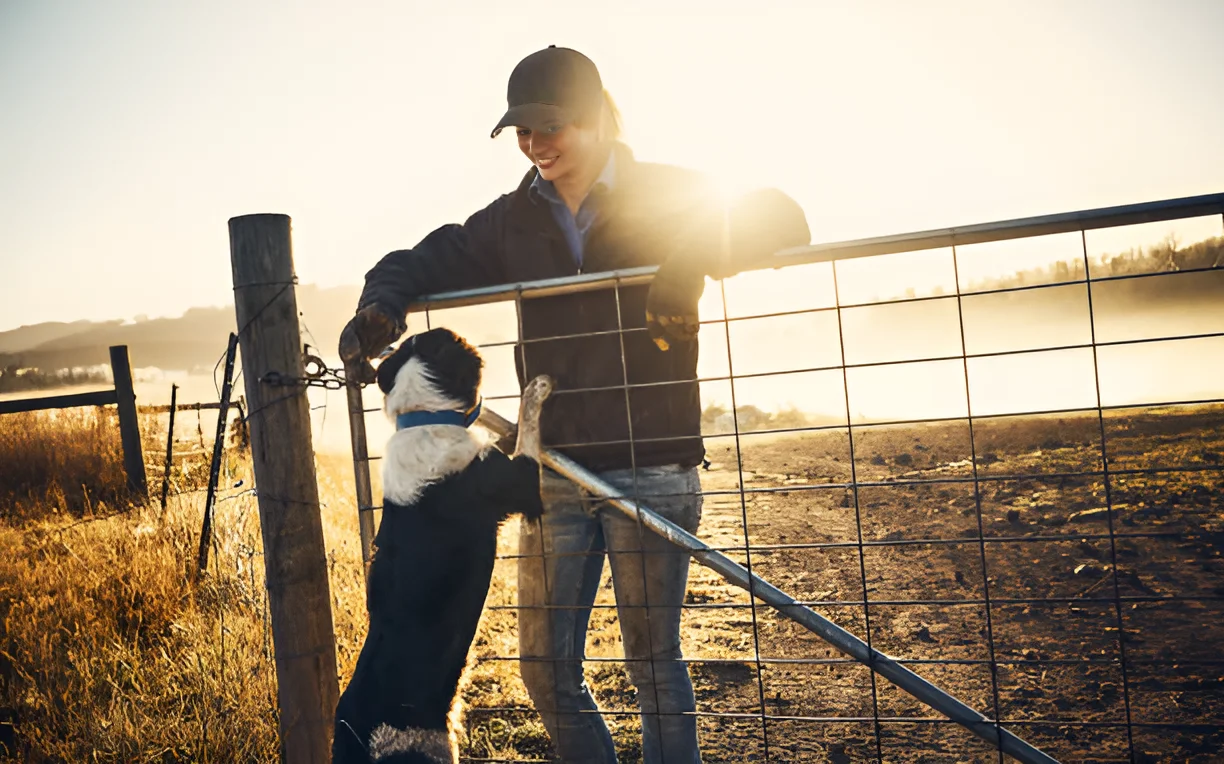Yes, farmers still use dogs for various tasks such as herding, guarding livestock, and providing companionship. Understanding the roles that dogs play on modern farms highlights their continued importance in agricultural operations.
Dogs have been invaluable partners to humans for centuries, particularly in agricultural settings. Despite advancements in technology and mechanization, dogs remain an essential part of farm life. This comprehensive guide will explore the various roles that dogs play on farms today, the benefits they provide, and how they contribute to the efficiency and safety of farming operations. Whether you’re a farmer considering adding a dog to your team or simply curious about the role of farm dogs, this article will provide valuable insights and practical information.
The Historical Role of Farm Dogs
Historically, dogs have been used on farms for a variety of purposes, including herding livestock, guarding property, and hunting pests. Their intelligence, loyalty, and versatility made them indispensable to farmers.
Herding: Breeds like Border Collies and Australian Shepherds were developed specifically for herding livestock. Their natural instincts and trainability made them perfect for managing large herds of sheep, cattle, and other animals.
Guarding: Breeds such as Great Pyrenees and Anatolian Shepherds were used to protect livestock from predators. Their size, strength, and protective nature made them effective guardians.
Pest Control: Terriers and other small breeds were often used to hunt and control rodent populations on farms. Their agility and keen sense of smell made them excellent at this task.
Modern Roles of Farm Dogs
While technology has transformed many aspects of farming, dogs continue to play crucial roles on modern farms. Their tasks have evolved, but their importance remains undiminished.
Herding and Livestock Management:
- Efficiency: Herding dogs can move livestock quickly and efficiently, reducing the need for multiple human workers.
- Stress Reduction: Well-trained herding dogs can move animals calmly and quietly, minimizing stress and injury to the livestock.
- Versatility: Different breeds excel in various environments and tasks. For example, Border Collies are known for their precision and control, while Australian Cattle Dogs are adept at handling more stubborn animals.
Guarding and Protection:
- Predator Deterrence: Guardian dogs protect livestock from predators such as coyotes, wolves, and bears. Their presence alone can deter many potential threats.
- Companionship: Guardian dogs often form strong bonds with the livestock they protect, providing a sense of security and reducing stress among the animals.
Companionship and Support:
- Emotional Support: Farm dogs provide companionship and emotional support to farmers, helping to alleviate the isolation and stress that can come with farm life.
- Work Companions: Dogs often accompany farmers during their daily tasks, providing both practical assistance and moral support.
Benefits of Using Dogs on Farms
The use of dogs on farms offers numerous benefits, both practical and emotional. Here are some key advantages:
Increased Efficiency: Dogs can perform tasks that would otherwise require multiple human workers, saving time and labor costs.
Enhanced Safety: Dogs can navigate difficult terrain and access areas that may be dangerous or inaccessible to humans. This reduces the risk of injury to farmers.
Improved Animal Welfare: Well-trained dogs can move livestock calmly and efficiently, reducing stress and the risk of injury to the animals.
Pest Control: Dogs can help control rodent populations, reducing the need for chemical pest control methods.
Emotional Well-Being: The companionship and emotional support provided by farm dogs can improve the mental health and well-being of farmers.
Training and Managing Farm Dogs
Proper training and management are essential to ensure that farm dogs perform their tasks effectively and safely. Here are some tips for training and managing farm dogs:
Early Socialization: Expose puppies to various environments, animals, and people from a young age to build their confidence and adaptability.
Consistent Training: Use positive reinforcement techniques to train dogs. Consistency is key to reinforcing desired behaviors and commands.
Task-Specific Training: Tailor training to the specific tasks the dog will perform. For example, herding dogs need to learn commands related to moving livestock, while guardian dogs need to understand their role in protecting animals.
Regular Exercise: Ensure that farm dogs get plenty of physical exercise to keep them healthy and prevent boredom.
Health Care: Regular veterinary check-ups, vaccinations, and parasite prevention are essential to keep farm dogs healthy and able to perform their duties.
Conclusion
Yes, farmers still use dogs for various tasks such as herding, guarding livestock, and providing companionship. Understanding the roles that dogs play on modern farms highlights their continued importance in agricultural operations. By providing proper training, care, and management, farmers can ensure that their dogs remain valuable partners in their farming endeavors.
The photo featured below the post headline is Credit: pixdeluxe/istockphoto
I hope you find this post helpful and informative. If Yes’ feel free to share it with your friends!
Frequently Asked Questions
Do farmers still use dogs?
Yes, farmers still use dogs for tasks such as herding, guarding livestock, and providing companionship.
What breeds are commonly used as farm dogs?
Common breeds include Border Collies, Australian Shepherds, Great Pyrenees, Anatolian Shepherds, and various terrier breeds.
How do herding dogs benefit farmers?
Herding dogs increase efficiency, reduce stress on livestock, and can perform tasks that would otherwise require multiple human workers.
What are the benefits of using guardian dogs on farms?
Guardian dogs protect livestock from predators, provide companionship to the animals, and enhance overall farm safety.
How should farm dogs be trained and managed?
Farm dogs should be socialized early, trained consistently with positive reinforcement, given task-specific training, provided regular exercise, and receive proper health care.

